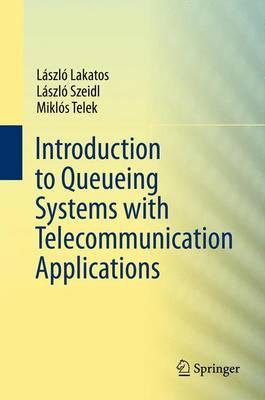Overview
The book is composed of two main parts: mathematical background and queueing systems with applications. The mathematical background is a self containing introduction to the stochastic processes of the later studies queueing systems. It starts with a quick introduction to probability theory and stochastic processes and continues with chapters on Markov chains and regenerative processes. More recent advances of queueing systems are based on phase type distributions, Markov arrival processes and quasy birth death processes, which are introduced in the last chapter of the first part. The second part is devoted to queueing models and their applications. After the introduction of the basic Markovian (from M/M/1 to M/M/1//N) and non-Markovian (M/G/1, G/M/1) queueing systems, a chapter presents the analysis of queues with phase type distributions, Markov arrival processes (from PH/M/1 to MAP/PH/1/K). The next chapter presents the classical queueing network results and the rest of this part is devoted to the application examples. There are queueing models for bandwidth charing with different traffic classes, slotted multiplexers, ATM switches, media access protocols like Aloha and IEEE 802.11b, priority systems and retrial systems. An appendix supplements the technical content with Laplace and z transformation rules, Bessel functions and a list of notations. The book contains examples and exercises throughout and could be used for graduate students in engineering, mathematics and sciences.
Full Product Details
Author: Laszlo Lakatos ,
Laszlo Szeidl ,
Miklos Telek
Publisher: Springer-Verlag New York Inc.
Imprint: Springer-Verlag New York Inc.
Edition: 2013 ed.
Dimensions:
Width: 15.50cm
, Height: 2.20cm
, Length: 23.50cm
Weight: 7.214kg
ISBN: 9781461453161
ISBN 10: 146145316
Pages: 388
Publication Date: 14 December 2012
Audience:
College/higher education
,
Professional and scholarly
,
Postgraduate, Research & Scholarly
,
Professional & Vocational
Replaced By: 9783030151416
Format: Hardback
Publisher's Status: Active
Availability: Manufactured on demand

We will order this item for you from a manufactured on demand supplier.
Reviews
From the reviews: The organization of the book is such that queueing models are viewed as special cases of more general stochastic processes, such as birth-death or semi-Markov processes. ... this book is a valuable addition to the queuing literature and provides instructors with a viable alternative for a textbook to be used in a one- or two-semester course on queueing models, at the upper undergraduate or beginning graduate levels. (Charles Knessl, SIAM Review, Vol. 56 (1), March, 2014) The authors of this new book ... present the material in an elegant and concise way, resulting in a good basic text that forms a foundation for readers who want to learn more advanced topics. ... Each chapter concludes with a few exercises. ... The writing style is quite formal and will be easily absorbed by a person well acquainted with mathematical modeling ... . the book will serve as a useful reference to quickly look up a theorem or proof. (Piotr Cholda, Computing Reviews, August, 2013) The book is composed of two main parts, namely Part I - Introduction to probability theory and stochastic processes, and Part II - Queueing systems. It consists of eleven chapters and an appendix. ... The book is highly recommended for students and researchers studying and working in the field of queueing theory and its applications. (Janos Sztrik, zbMATH, Vol. 1269, 2013)
From the reviews: The authors of this new book ... present the material in an elegant and concise way, resulting in a good basic text that forms a foundation for readers who want to learn more advanced topics. ... Each chapter concludes with a few exercises. ... The writing style is quite formal and will be easily absorbed by a person well acquainted with mathematical modeling ... . the book will serve as a useful reference to quickly look up a theorem or proof. (Piotr Cholda, Computing Reviews, August, 2013) The book is composed of two main parts, namely Part I - Introduction to probability theory and stochastic processes, and Part II - Queueing systems. It consists of eleven chapters and an appendix. ... The book is highly recommended for students and researchers studying and working in the field of queueing theory and its applications. (Janos Sztrik, zbMATH, Vol. 1269, 2013)
Author Information
The authors of this book have been doing research and modeling in the theoretical and practical field of queuing theory for several decades, and teaching in both BSc, MSc and doctoral programs at the Faculty of Informatics, Eotvos Lor'and University, Faculty of Engineering Sciences, Sz'echenyi Istv'an University and the Faculty of Electrical Engineering and Informatics, Budapest University of Technology and Economics (all located in Hungary).




